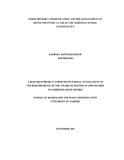| dc.contributor.author | Kimosop, Raphael K | |
| dc.date.accessioned | 2013-12-19T08:32:08Z | |
| dc.date.available | 2013-12-19T08:32:08Z | |
| dc.date.issued | 2013-11 | |
| dc.identifier.citation | Master Of Arts Degree In Communication Studies, | en_US |
| dc.identifier.uri | http://hdl.handle.net/11295/62249 | |
| dc.description.abstract | This study sought to establish the role of participatory communication in the
management of devolved funds with special focus on the CDF in Baringo Central
Constituency. Governments the world over spend millions of dollars every year in
efforts to develop their countries like combating poverty and mitigate its effects
among the affected communities but challenges continue to hinder those noble
initiatives to raise the living standards of citizens.
KIPPRA in its baseline survey of 2006 on the impact of the seven devolved funds in
Kenya (the CDF included) found that there were serious challenges preventing them
from reaching their full potential. Over 90% of the respondents indicated that they
were not involved in setting the development agenda for their areas “Awareness and
information must by nature be a precursor to effective public participation” KIPPRA
(2006).
This study is an endeavor to bring to light the role of participatory communication in
the management of devolved funds (including CDF) with an aim of proposing new
and innovative participatory communication strategies. Respondents in this study
were sampled using a ratio that mimicked a proportion of number of registered voters
in the respective wards of Baringo Central Constituency. Questionnaires and focused
group discussions were the instruments used in data collection.
Both quantitative and qualitative research methods were used in this study in order to
ensure that empirical evidence is available to guarantee the validity and reliability of
the inferences that were made from the data collected as well as to ensure that the
study was holistic. The study found that participatory communication as a strategy
was not adopted in the management of CDF in Baringo Central Constituency and that
there are still many challenges and legal obstacles that hinder participatory
communication in the management of CDF.
The study recommends corrective measures in a number of strategies to cure these
challenges. Among these raft of measures, the study proposes that the citizen’s right
to participate in the management of CDF is protected by the CDF Act and that roles of
each person, actor, entity and stakeholder are clearly spelt out by relevant laws and
regulations governing CDF. The study also proposes that citizens should be given all
the information necessary for them to make informed choices on what projects best
benefit the majority and are best value for their money. | en_US |
| dc.language.iso | en | en_US |
| dc.publisher | University of Nairobi, | en_US |
| dc.title | Participatory Communication and the Management of Devolved Funds: a Case of Cdf, Baringo Central Constituency | en_US |
| dc.type | Thesis | en_US |

